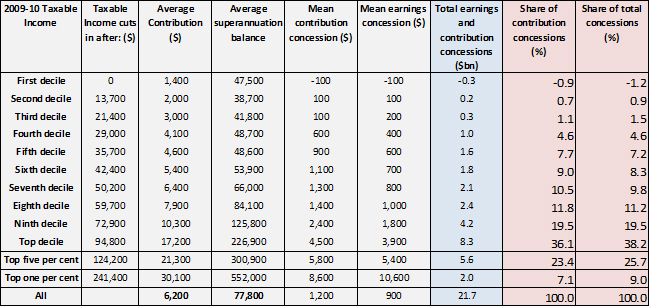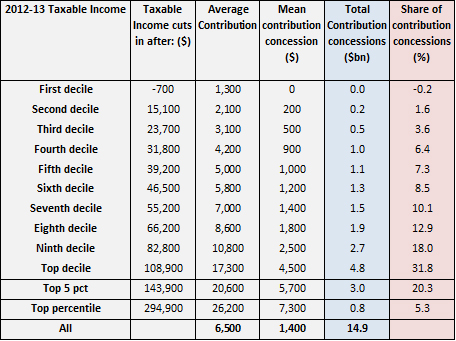A paper to the Superannuation Roundtable
This paper presents Treasury analysis on the distribution of superannuation taxation concessions as presented to the Superannuation roundtable of 23 April 2012. The analysis does not include May 2012 Budget measure which reduced concessions on contributions for very high income earners.
Superannuation is taxed concessionally
While personal income is generally taxed at individuals' marginal tax rates, superannuation is taxed concessionally to support and encourage individuals to save for retirement:
- Contributions phase – contributions are taxed at a flat rate of 15 per cent in the fund. This will generally be concessional compared with higher individual marginal tax rates – see Table 1.
- Accumulation phase – investment earnings are taxed at a flat 15 per cent (can be 10 per cent for capital gains) which will be concessional compared with higher individual marginal rates.
- Retirement phase – investment earnings (including capital gains) can be tax exempt – taxed at 0 per cent – if they are from assets supporting superannuation pensions. Superannuation payments to individual members will generally be tax free where members are 60 or over.
Table 1: Comparison of superannuation taxation and personal income taxation 2012-13
| Income | Marginal Personal Tax Rate | Super contributions and investment earnings in accumulation phase | Investment earnings in pension phase | Benefit payments in taxed funds |
|---|---|---|---|---|
| $0 ‑ $18,200 | 0% | 15% (capital gains can be 10%) | 0% | 0% |
| $18,201 ‑ $37,000 | 19% | 15% (capital gains can be 10%) | 0% | 0% |
| $37,001 ‑ $80,000 | 32.5% | 15% (capital gains can be 10%) | 0% | 0% |
| $80,001 ‑ $180,000 | 37% | 15% (capital gains can be 10%) | 0% | 0% |
| $180,001 and above | 45% | 15% (capital gains can be 10%) | 0% | 0% |
Value of tax concessions
The 2011 Tax Expenditure Statement estimates tax concessions on superannuation at approximately $32 billion in 2012-13. This is the second largest tax expenditure. Concessions on contributions are estimated at $16.5 billion and on superannuation earnings at $15.5 billion.
Distribution of tax concessions
The following two tables analyse the distribution of superannuation tax concessions. The first table uses actual 2009-10 data to estimate concessions on contributions and earnings. The second table is estimates of the concessions on contributions in 2012-13. The share of concessions increases as you move up the income scale.
- It is estimated that in 2012-13 the top 5 per cent of contributors will receive 20.3 per cent of contribution concessions. The top 1 per cent will receive 5.3 per cent of contribution concessions. (Refer Table 3)
- Higher income earners also receive more of the earnings tax concessions. (Refer Table 2)
Table 2: Actual distribution of superannuation tax concessions 2009-10

Table 3: Forecast distribution of contributions concessions 2012-13

Change in distribution of contribution concessions since 2007
Figure 1 shows the change in distribution of concessions since 2007:
- An increase in concessions for low income earners from the low income superannuation contribution.
- Concessions for higher income earners decreased after the reduction in the contribution caps.
Figure 1: Change in distribution of contribution concessions since 2007

Level of support provided by age pension and superannuation combined
Figure 2 adds age pension support to the support provided by taxation concessions:
- Age pension support is highest for lower income earners and superannuation tax concession support is higher for higher income earners.
- Total combined support starts to increase clearly for the top 10 per cent of income earners;
- The top 1 per cent of income earners receive the most combined support.
Figure 2: Distribution of "total government support" (both superannuation tax concessions and Age Pension)

The membership of the Superannuation Roundtable were: The Hon. Bill Shorten MP (Chair), Hazel Bateman, John Brogden, Everald Compton, Richard Denniss, Paul Gerrans, Dr Cassandra Goldie, Melinda Howes, Ged Kearney, Mark Rantall, Fiona Reynolds, Andrea Slattery, Peter Strong, Pauline Vamos, David Whitely, Cate Wood.